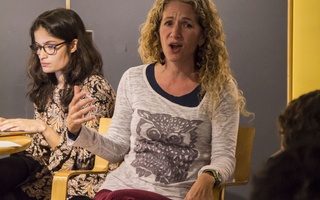Laws regarding rape should be taught in criminal law classes at Harvard Law School despite its potential to trigger psychological trauma, two Law professors argued at a discussion on the topic Wednesday afternoon.
Law professor Jeannie C. Suk, who has taught criminal law and procedure at the Law School, and Andrew M. Crespo ’05, who served as Harvard Law Review’s first Latino president and will teach criminal law for the first time next fall, both stressed the pedagogical value of including rape law in a curriculum. Suk spoke out on the issue when she penned a New Yorker article called “The Trouble with Teaching Rape Law" in December.
At the well-attended discussion, Suk and Crespo said law school students should engage with potentially emotionally difficult cases in preparation for their role in the legal world.
“Getting through that challenge together as a class, to have challenging discussions, to be able to analyze and to provoke and to respond to and to reason through these challenging subjects is a big part of what it is lawyers do in our society,” Suk said.
Crespo added that teaching rape law offers a unique opportunity to connect law students in a more personal way to crime. While law school students can be far removed from most criminal activities like drug arrests, rape is an issue they are more likely to have encountered, whether in a collegiate environment or elsewhere, Crespo said.
{shortcode-215d481361b8f86765896f84dd3db9938f9acef5}
“I think that with rape, everyone can relate to it in a way that is more personal and that allows for us to talk about crime as something that affects us personally,” Crespo said.
Wednesday’s discussion comes amid controversy over Harvard's sexual assault and harassment policy and procedures among the Law School faculty. Last October, 28 Law School faculty members, including Suk, penned an open letter in The Boston Globe criticizing Harvard's University-wide sexual harassment policy and procedures for what they claimed was its lack of due process. In December, the Law School was found in violation of Title IX, and in a break from the University-wide policy, the Law School faculty voted to adopt its own set of sexual harassment procedures. They are awaiting feedback from the U.S. Department of Education’s Office for Civil Rights.
Suk said the event’s discussion related to her earlier criticisms about the way Harvard's central policy characterizes sexual harassment. Under the specific language of Harvard’s definition of sexual harassment, Suk said, “there’s a fear” that normal classroom discussions about sex and sexuality could be construed as sexual harassment.
—Staff writer Andrew M. Duehren can be reached at andy.duehren@thecrimson.com. Follow him on Twitter @aduehren.
Read more in University News
Gould Elected 129th President of Harvard Law ReviewRecommended Articles
-
Radcliffe Prowler To Appear Today On Rape ChargesFrancis J. Gallagher, arrested Friday night as the prowler who terrorized two Radcliffe houses the previous evening, will be arraigned
-
Harvard Seeks Wider Perceptions of Rape"People only think of rape someone grabbing you on the street or in a dark alley," says Nadja Gould, a
-
Hussain Witness Testifies Wife Denied Being RapedThe husband of the alleged rape victim in the trial of former Harvard-affiliated doctor Atif Hussain testified yesterday that his
-
Law School Found in Violation of Title IX after Years-Long ProbeIn its investigation into the Law School’s Title IX compliance, the Department of Education's Office for Civil Rights found that the Law School “failed to comply with Title IX's requirements for prompt and equitable response” to complaints of alleged sexual harassment and sexual assault.
-
 New Law School Sexual Harassment Procedures Break From University Framework
New Law School Sexual Harassment Procedures Break From University Framework -
 Central Office To Hear FAS Faculty Sexual Harassment Cases
Central Office To Hear FAS Faculty Sexual Harassment Cases













